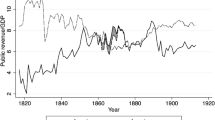Summary and conclusion
This paper has provided empirical evidence on the relationship between transfers to the military and the degree of political competition in a country. It has been argued that in both democratic and autocratic rent-seeking societies, the military may have a significant advantage in capturing government transfers. In democratic societies, the role of the military as guardian of national security puts it in a unique position to seek transfers. As a result, military elites in these countries have been quite successful in influencing the political system to increase rents to them and members of their group. In dictatorships, violence is an important rent-seeking behavior. Since the military has a comparative advantage in violence, it has emerged as the dominant rent-seeking interest group in these countries. As a result, military groups dominate resource allocations in most politically unstable countries.
The dictator, who also holds a monopoly in the supply of legislation, is protected by members of the dominant group. In the case in which the military is the dominant group and provides the dictator with protection in exchange for rents, military elites will work to stunt the development of interest groups that could threaten the dictator's monopoly on power or the military's rent stream. Such rent-seeking activities by the military should significantly constraint the development of political competition in the country.
Similar content being viewed by others
References
Brough, T. and Kimenyi, M.S. (1986). On the inefficient extraction of rents by dictators. Public Choice 48(1): 37–48.
Browning, E. (1974). On the welfare costs of transfers. Kyklos 27(2): 378–381.
Crandall, R. (1986). Economic rents as a barrier to deregulation. Cato Journal 6(1): 173–194.
Flowers, M.R. (1987). Rent-seeking and rent dissipation: A critical view. Cato Journal 7(2): 431–440.
Kimenyi, M.S. (1987). Bureaucratic rents and political institutions. Journal of Public Finance and Public Choice 3: 189–199.
Kurian, G.T. (1984). The new book of world rankings, 1984. New York: Facts on File Inc.
Mbaku, J.M. (1988). Political instability and economic development in Sub-Saharan Africa: Some recent evidence. The Review of Black Political Economy 17 (Summer): 89–112.
Mbaku, J. and Paul, C. (1989). Political instability in Africa: A rent-seeking approach. Public Choice 63(1): 63–72.
Tullock, G. (1974). The social dilemma. Fairfax, VA: Center for Study of Public Choice, George Mason University.
U.S. Arms Control and Disarmament Agency. (1989). World military expenditures and arms transfers, 1988. Washington, DC: United States Arms Control and Disarmament Agency.
World Bank. (1989). World tables, 1988–89. Baltimore: The Johns Hopkins University Press for the World Bank.
Author information
Authors and Affiliations
Rights and permissions
About this article
Cite this article
Mbaku, J.M. Military expenditures and bureaucratic competition for rents. Public Choice 71, 19–31 (1991). https://doi.org/10.1007/BF00138447
Received:
Accepted:
Issue Date:
DOI: https://doi.org/10.1007/BF00138447




